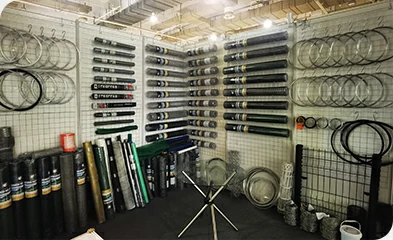 TEL:
+86-13102802206
TEL:
+86-13102802206
 Email:
fencenetting@china.com
Email:
fencenetting@china.com
 Language
Language
 TEL:
+86-13102802206
TEL:
+86-13102802206
 Email:
fencenetting@china.com
Email:
fencenetting@china.com
 Language
Language


Exploring the Versatility of Stone Wire Cages
In recent years, stone wire cages have gained significant popularity in various construction and landscaping projects around the world. These unique structures, often referred to as gabions, are wire mesh containers filled with stones, gravel, or rock. They offer an innovative solution for a variety of environmental and aesthetic challenges, making them a favored choice for engineers, architects, and landscape designers alike.
Historical Context
The use of wire cages filled with stones can be traced back to ancient times, particularly in riverbank stabilization and fortification. Originally designed to prevent erosion and manage water flow, these cages were constructed from locally available materials, showcasing the ingenuity of early civilizations. Over the years, the applications of stone wire cages have expanded dramatically, evolving into an integral part of modern civil engineering and landscape architecture.
Structural Integrity and Durability
One of the primary advantages of stone wire cages is their structural integrity. When properly designed and filled, gabions are incredibly durable structures that can withstand extreme weather conditions, including heavy rains, floods, and harsh temperature changes. The wire mesh often made from galvanized steel or PVC-coated materials offers excellent resistance to rust and corrosion, ensuring that the structure maintains its integrity over time. The infill material, typically composed of granite, limestone, or other durable stones, also emphasizes strength and stability, making these cages a reliable solution for retaining walls, foundations, and erosion control.
Environmental Benefits
Stone wire cages are not only admired for their robustness but also for their environmental benefits. Their use promotes a sustainable approach to construction by utilizing natural materials that blend seamlessly into the landscape. The gap between the stones allows for water permeability, thus preventing waterlogging and promoting healthy drainage. Additionally, they help support local ecosystems by providing habitats for flora and fauna along riverbanks and landscapes.

Furthermore, gabions facilitate vegetation growth, as the space between the rocks can accommodate soil and plant roots, promoting biodiversity. This green aspect of gabions plays a pivotal role in reducing the urban heat island effect and creating more liveable urban spaces.
Aesthetic Appeal
In addition to their functional attributes, stone wire cages also offer a unique aesthetic appeal. Available in various shapes, sizes, and colors, they can be customized to enhance the visual impact of any project. From retaining walls to decorative garden features, gabions can be integrated into contemporary designs or rustic landscapes, providing a natural look that harmonizes with the surrounding environment. Designers have creatively used these structures not just for their practicality but also as artistic features, turning ordinary spaces into stunning focal points.
Versatile Applications
The flexibility of stone wire cages makes them suitable for a myriad of applications. They can be used in civil engineering projects for flood control and soil stabilization, in parks and recreational areas for seating and landscaping, and in residential areas for decorative features. Their versatility allows for innovation in design, enabling architects and builders to incorporate them into various settings, from urban environments to rural landscapes.
Conclusion
In conclusion, stone wire cages, or gabions, are much more than simple constructions of rocks and wire. Their historical significance, structural integrity, environmental benefits, aesthetic versatility, and myriad applications make them an invaluable resource in modern construction and landscape design. As we continue to focus on sustainable practices and innovative engineering solutions, gabions will undoubtedly remain a significant element in bridging the gap between functionality and beauty in our built environments.